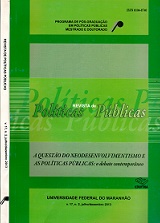PLANIFICACIÓN Y DESSARROLLO EM LA PROVINCIA DE BUENOS AIRES: em rol del Consejo de Planificación Regional de Educación Superior em la implementación de las Politicas Educativas
DOI:
https://doi.org/10.18764/2178-2865.v17n2p436-445Palavras-chave:
gobierno, poder, territorioResumo
El trabajo describe y analiza la actuación del Consejo de Planificación Regional de Educación Superior (CPRES) desde la sanción de la Ley 24.521/95 hasta 2011 en base a una indagación de su diseño institucional y el desempeño de sus actores relevantes. Del universo, compuesto a nivel nacional por siete regiones CPRES, se seleccionó el caso de la región bonaerense. Ésta representa, junto con el área metropolitana, uno de los territorios con mayor población y actividadeconómica de la Argentina. Además, concentra a más de un tercio de las instituciones de educación superior que integran la oferta total del país. El trabajo analizó, en profundidad, fuentes documentales y entrevistas a informantes clave del ámbito académico, técnico y político que participaron del Programa de Reforma de la Educación Superior, iniciado en 1995. Los resultados evidencian que el CPRES se constituye como una estructura de autoridad de nivel intermedio con atribuciones
jurídico-institucionales para planificar, coordinar, y regular los procesos de elaboración e implementación de políticas públicas en el marco de un contexto sistémico complejo y de alta diferenciación institucional. Sin embargo, aún no logran constituirse en efectivas autoridades de implementación.
Palabras clave: gobierno; poder; territorio
PLANNING AND LAND DEVELOPMENT IN THE PROVINCE OF BUENOS AIRES: the role of regional planning council for higher education in educational policy implementation Abstract: The paper describes and analyzes the performance of the Regional Planning Council of Higher Education (CPRES) from its acronym in Spanish) since the enactment of Law 24.521/95 until
2011 based on a survey of its institutional design and the performance of its stakeholders. In a universe, consisting of seven national regions CPRES, the Buenos Aires region was selected.
This represents, together with the metropolitan area, one of the areas with the highest population and economic activity in Argentina. Furthermore, concentrated over a third of the colleges that make up the country’s total supply.
Documentary sources were analyzed and in-depth interviews with key informants from the academic,technical and political participation of the Reform Program of Higher Education started in 1995. The results show that the ERCP was established as an authority structure intermediate legal and institutional capacity to plan, coordinate, and regulate the processes of development and implementation of public policies in the backdrop of a complex and high systemic institutional differentiation.
However, still fail to become effective implementation authorities.
Keywords: government, power, territory.
Downloads
Não há dados estatísticos.
Downloads
Publicado
2014-07-07
Como Citar
GONZÁLEZ, Giselle. . Acesso em: 20 abr 2024.
PLANIFICACIÓN Y DESSARROLLO EM LA PROVINCIA DE BUENOS AIRES: em rol del Consejo de Planificación Regional de Educación Superior em la implementación de las Politicas Educativas
. Revista de Políticas Públicas, v. 17, n. 2, p. 436–445, 7 Jul 2014Tradução . . Disponível em: Edição
Seção
Artigos - Temas livres
Licença
UNIVERSIDADE FEDERAL DO MARANHÃO
PROGRAMA DE PÓS-GRADUAÇÃO EM POLÍTICAS PÚBLICAS
REVISTA DE POLÍTICAS PÚBLICAS
Termo de Transferência de Direitos Autorais
Como condição para a submissão, os autores devem declarar a autoria do trabalho e concordar com o Termo de Cessão de Direitos Autorais, marcando a caixa de seleção após a leitura das cláusulas)
- Declaro que participei da elaboração do trabalho referido, em parte ou no todo; que não omiti qualquer ligação ou acordo de financiamento entre os autores e instituições ou empresas que possam ter interesses na publicação desse trabalho;
- Declaro tratar-se de texto original, isento de compilação, em parte ou na íntegra, de minha autoria ou de outro (os) autor (es);
- Declaro que o texto não foi enviado a outra revista (impressa ou eletrônica) e não o será enquanto a possibilidade de sua publicação esteja sendo considerada pela RPP;
- Declaro que transfiro os direitos autorais do trabalho especificado para a RPP, comprometendo-me a não reproduzir o texto, total ou parcialmente, em qualquer meio de divulgação, impresso ou eletrônico, sem prévia autorização dessa Revista.
- Declaro que tenho conhecimento que a cessão do texto à RPP é gratuita e, portanto, não haverá qualquer tipo de remuneração pela sua utilização.

Este obra está licenciado com uma Licença Creative Commons Atribuição-NãoComercial-SemDerivações 4.0 Internacional.






